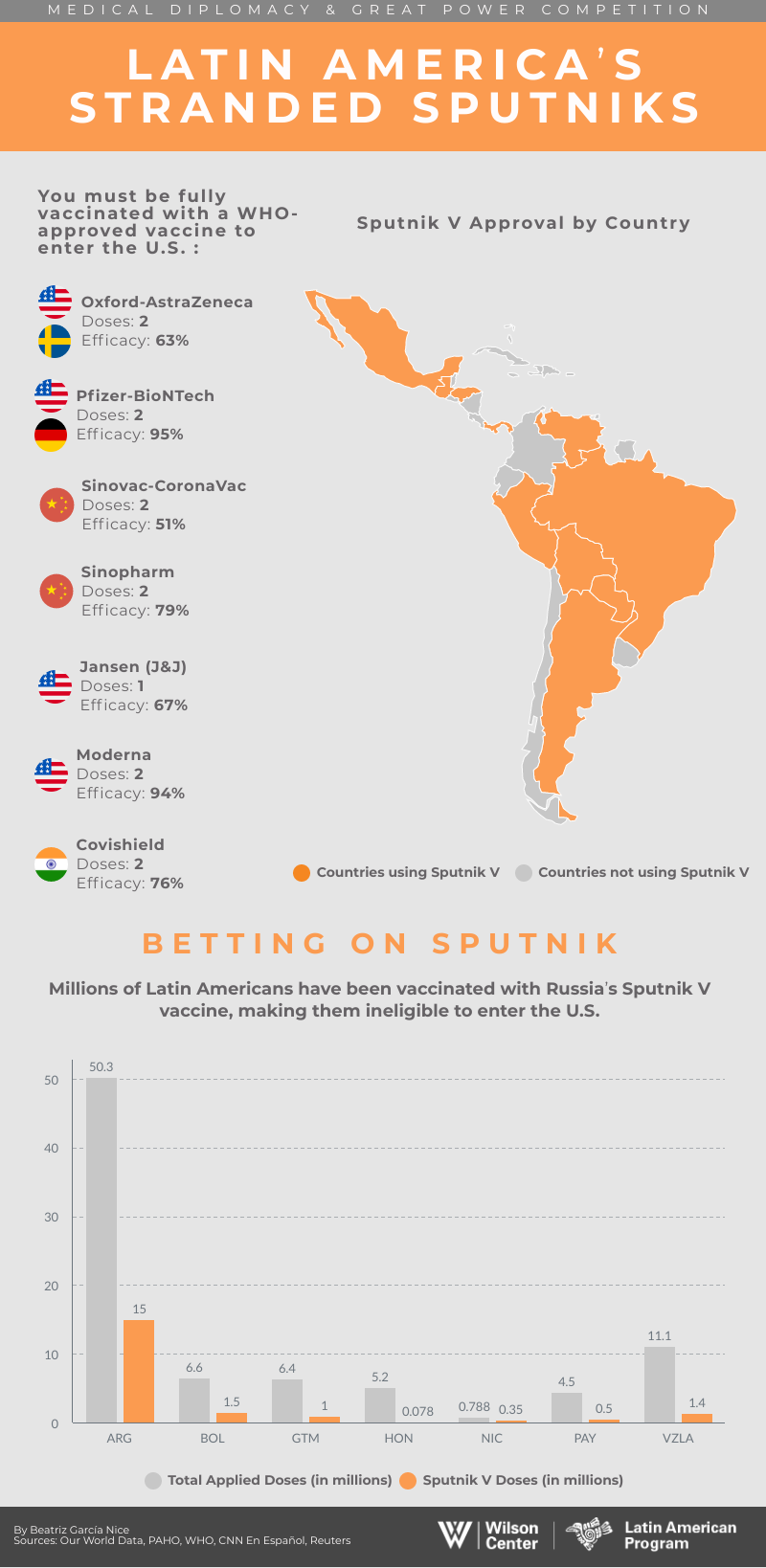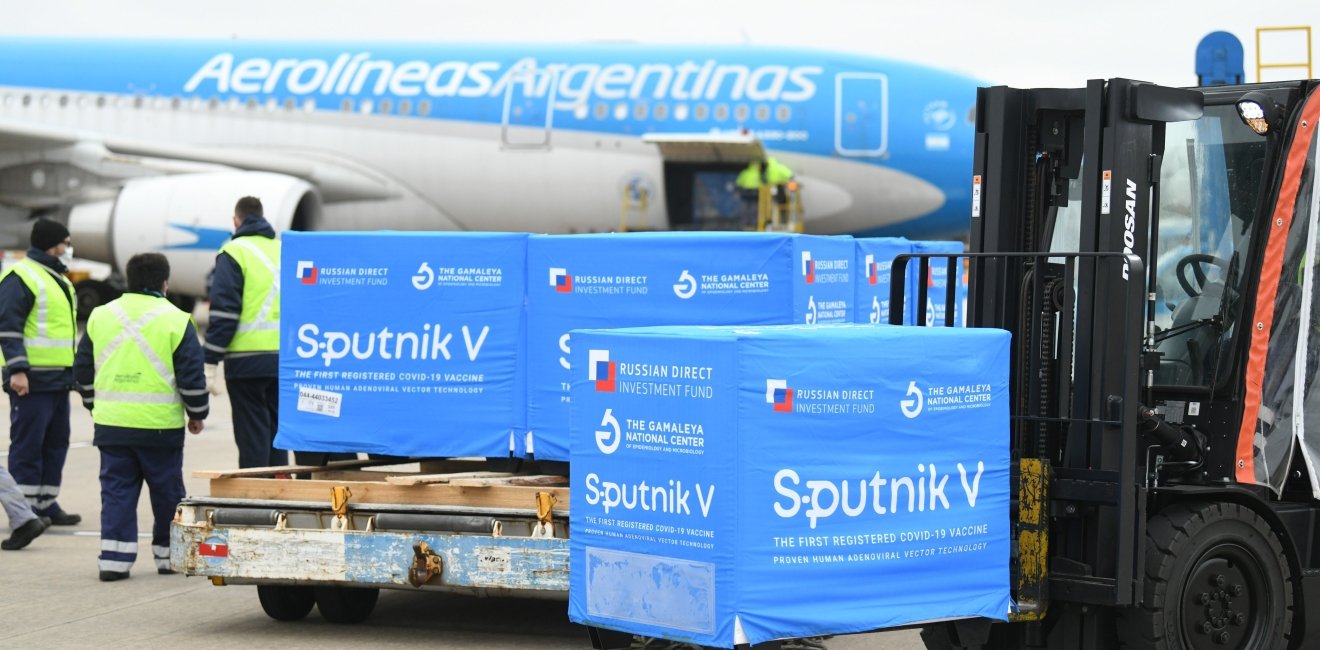
A blog of the Latin America Program
After 18 months, the United States has reopened its borders to international travelers, but only for those fully vaccinated with a World Health Organization (WHO)-approved vaccine. The White House announcement was welcome news overseas after nearly two years of limited access to the United States. But for millions of fully vaccinated Latin Americans, the door remains shut. That is because Centers for Disease Control and Prevention (CDC) guidelines deny entry to individuals who received Russia’s Sputnik vaccine. As a result, travel from Latin America, a region deeply interconnected to the United States, will remain artificially depressed. Almost 12 million Latin Americans visited the United States in 2019. The following year, the total dropped to 3.5 million.
During the height of the COVID-19 pandemic, Latin American governments scrambled to get their hands on vaccines amid surging caseloads and limited access to U.S.-produced doses. Low supplies and high prices led to accusations of “vaccine hoarding,” and increased dependency on the WHO’s slow vaccine distribution program, COVAX. The result was not only delays in inoculating the region’s population, but also a decision by many Latin American leaders to turn to Russia and China for help. In the absence of meaningful U.S. “vaccine diplomacy,” Moscow and Beijing moved swiftly to market their vaccines in the Western Hemisphere.

Russia was the first country to announce a successful COVID-19 vaccine, in August 2020. After Russian authorities touted an efficacy rate that exceeded 90 percent, the Gamaleya Institute exported hundreds of millions of doses, mostly to developing countries, including in Latin America. In all, Sputnik is in use in 50 countries. But unlike China, where the CoronaVac and Sinopharm vaccines are authorized by the WHO, Russia has failed to win WHO approval for Sputnik, reportedly because of its rushed rollout and limited transparency.
Russia insists WHO approval is imminent. But in the meantime, individuals who received a Sputnik jab have limited travel options. That includes a vast number of Latin Americans. Until recently, Venezuelans and Guatemalans only had access to the Sputnik vaccine. Argentina has purchased 30 million Sputnik doses, and begun producing the vaccine locally. Mexico has imported 24 million shots, and Guatemala and Bolivia also rely heavily on the Russian jab, even as the United States accelerates vaccine donations to Latin America.
The CDC decision provoked an angry response from the Russian government, but it also increased scrutiny of leaders who bet big on Sputnik. In Argentina, for example, the opposition assailed the government for its slow negotiations with Pfizer and rapid deal making with Moscow: “Millions of Argentines are hostages to a geopolitical decision by the national government that prioritized relations with Russia.”
For more information on international responses to Latin America’s pandemic challenges, visit our “medical diplomacy” and “vaccine diplomacy” trackers.
Author


Latin America Program
The Wilson Center’s prestigious Latin America Program provides non-partisan expertise to a broad community of decision makers in the United States and Latin America on critical policy issues facing the Hemisphere. The Program provides insightful and actionable research for policymakers, private sector leaders, journalists, and public intellectuals in the United States and Latin America. To bridge the gap between scholarship and policy action, it fosters new inquiry, sponsors high-level public and private meetings among multiple stakeholders, and explores policy options to improve outcomes for citizens throughout the Americas. Drawing on the Wilson Center’s strength as the nation’s key non-partisan policy forum, the Program serves as a trusted source of analysis and a vital point of contact between the worlds of scholarship and action. Read more


Argentina Project
The Argentina Project is the premier institution for policy-relevant research on politics and economics in Argentina. Read more

Explore More in Weekly Asado
Browse Weekly Asado
Dengue Haunts South America’s Summers

Lessons from Costa Rica’s Economic Transformation

Women and Latin America’s Digital Revolution

